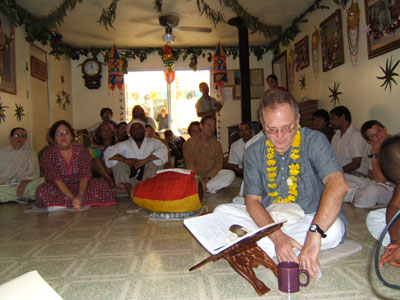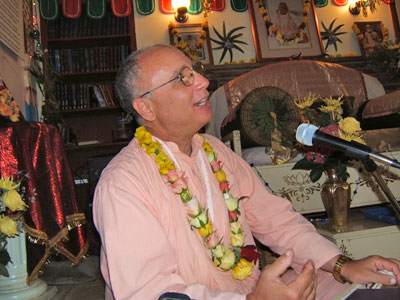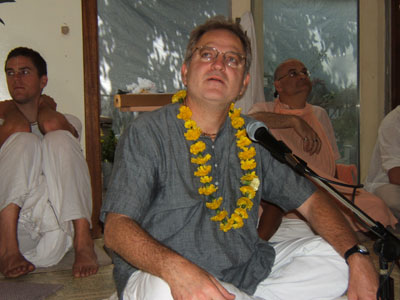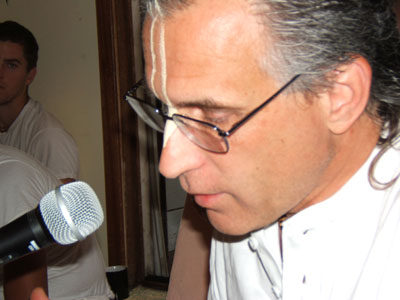

Back inside the temple room, a few devotees spoke about their days with Srila Prabhupad.

Sripad Janardan Maharaj, who knew Srila Prabhupad for many years, tells us some stories:
Now, we see that Srila Prabhupad, as a result of his mission, is famous all over the world. His name is in the encyclopedias like the Encyclopedia of Brittanica, and the World Book, and he was on a postage stamp in India a few years back. He has become synonymous for Mahaprabhu's preaching mission all over the world. I'd just like to say something about Srila Prabhupad. When I actually met Prabhupad, I could never know how tall Prabhupad was. I could not conceive what his height was. Maybe physically he was not tall, but to me he always looked beyond my estimation. It's not like you could measure him in terms of his height, he was like a giant in the sense that, just being there, you didn't conceive of Prabhupad in terms of normal criterium.
I remember when I first met the devotees, I met them in Copenhagen and I didn't really know anything about Krishna consciousness. I had seen the devotees before in America, like in Berkeley, but I didn't know anything about them. When I met the devotees in Copenhagen, somehow or other I let them stay in the house that I was taking care of. The devotees came there from England and said they wanted to start a temple there, so I said: "Oh yeah, move in here you can start a temple in this house." I had no idea what it entailed, but soon afterwards I found out and I became involved. Although I didn't know anything about Krishna consciousness and I can't say that I was completely sure that I wanted to become involved in this, I remember that early in the morning, I would listen to the books and was very attracted. I was particularly attracted by Prabhupad's book, 'The teachings of Lord Chaitanya.' To me it was the most beautiful thing and I thought I was floating every time I would hear this beautiful philosophy.
In those days, we had Srila Prabhupad's first Bhagavatams that were published in India and somehow or other, they were so unique. They were full of many typographical mistakes from the printing in Dehli, (jokingly) but that was all even more attractive. It refered to the "cowhard girls" and the "supreme lard" (the devotees start laughing). If you can go through them now you will see that but it was the look of the paper, and the binding, that made you think, this is the spiritual world, this is something unique. I had never seen anything like that. So then later, at the end of 1970 and the beginning of 1971, I had the opportunity, to go to India. They were sending me to India and I was a little bit reluctant because I didn't know if I wanted to get involved in all of this, but at the same time I thought: If I go to India, I will be able to acquire these books that I wanted. I had the third volume first canto of Srimad Bhagavatam, but the other two were sold out so I thought: Why not, I might as well get those books. So I decided to go to India and when I got to India, we went to Bombay to see Prabhupad.
They had just started the pandal program at Cross Maidan and it was huge. There were a hundred thousand people coming every night to that program at Cross Maidan. There were billboards all over the city announcing the Hare Krishna movement and it was just amazing. Srila Prabhupad had now taken India by storm. His comment was: "If you're going to hunt, then hunt for the rhinoceros and if you're going to rob, rob Fort Knox where all of the gold is kept. Because if you don't succeed, then everyone will just say that it couldn't have been done. But if you do succeed, then it will turn the whole world on its end." His idea was to do something in a big way.
So that's the way Cross Maidan was. In front of all of these thousands
and thousands of people coming to Bombay, Srila Prabhupad was speaking
loudly with these cone speakers being broadcasted all over. Sometimes
the sound was a little distorted but it was loud and attracting the people.
People were joining and coming, devotees were being initiated on stage
at the program. There were even marriages on stage. This was a big thing
and it was very, very amazing. People in Bombay, they were shocked. It
was happening in a big way. Whenever the devotees would go outside, people
would crowd around and just stare at them. You could be doing nothing,
just waiting at a bus stop or at the train station and fifty or a hundred
people would gather around and stare at you. They were becoming attracted.
In those days, as it would have been said, Srila Bhakti Siddhanta Saraswati Prabhupad had asked Srila Prabhupad to go to the Western countries and preach. It was his plan to establish Krishna consciousness in the very center of the materialistic civilization which was the West, because the Indians in particular were also emigrating to the West. The idea was that if you could capture the West, you could capture India, and then the whole world. So Prabhupad began that, and when we came to India you could see how it had been affected by the West.
I remember once that I was walking with Srila Prabhupad near Juhu Beach
in Bombay and I said to Prabhupad, you know, trying to impress him: "Prabhupad,
just see how all of these people are mad after sense gratification."
Prabhupad just turned to me and said: "You brought the poison with
you." Meaning that the West had changed India. India had been under
England and was being changed by the Western conception and you could
see it. People would walk around with these 007 belts, James Bond.
In those days, they didn't have so much of that cinema bhajan music but
it was even worse. They would have the pujas, such as Durga Puja and other
pujas, and would be playing music like 'Tequila.' I remember in puja time
they would be broadcasting Nancy Sinatra singing: "These boots are made
for walking, and one of these days these boots are going to walk all over
you." This was during religious ceremonies in Kolkata. So there was this
influence going on, but gradually, over the course of thirty years we
can all see that India has been greatly changed by Prabhupad's mission.
All of India, the whole history of India, has been changed by the work
that Srila Prabhupad did. Maybe in the West, Western scholars or newspaper
writers may not be aware of it, but anyone who lives in India, especially
in the major cities as well as in the countryside, people are all aware
of the Krishna conscious movement.
From Cross Maidan we went to Kolkata and a big program was being organized in the Esplanade. India was under the control of the Naxelites. The Naxelite movement was very big in Kolkata at that time and they were sometimes killing and kidnapping as many as ten or fifteen people every week, and people were afraid. So Prabhupad was doing this big program in the Esplanade, and one time he got this note that said: "Fly or Die" but Prabhupad was not affected by that.
The same thing that was happening in Bombay was also going on in Kolkata.
The Esplanade program was huge. Prabhupad would say that rice was the
staple of Bengal. For Bengal, and many states in southern India, rice
was the staple but at those pandal programs they would be distributing
puris and alu-dam in the evening. I saw literally riots where people were
fighting to get the puris and the subji. I remember that also, during
the Bangladesh War, Srila Prabhupad was preaching in another part of Kolkata
in Desyapriya Park and there there were curfews and more black outs than
many things. Many times in the night there were many black outs and you
weren't supposed to even light a candle. Prabhupad would preach at Desyapriya
Park and he was like the simha guru. His voice would just crackle over
the loudspeakers and it was electric. There was just so much energy there,
his preaching was so amazing and so attractive.
I remember we also went to a college near Kalighat in Kolkata, like
a high-school almost, and there were many radical students there. I remember
that afterwards, one student challenged Prabhupad. The student said: "We
see that many of you are foreigners and you seem to be all interested,
but here we are all Bengalis and we don't see that the Bengali students
are very interested. Why is that?" The way this kid said it was kind
of vicious. Then, Prabhupad very calmly said: "Well, if none of you
are interested, then you must be one of four kinds of people." He
said:
na mam duskrtino mudhah, prapadyante naradhamah
maya yapahrta-jnana, asuram bhavam asritah
"Maybe you are one of these four kinds of people. Either you are duskritina impious; mudha, you are like asses, just working hard all day long for a little bit of food and some sex; or naradhamah, lowest among men - maybe you have much interest in many of the cultural things, but no interest in your actual spiritual identity, your real life. No interest in that, naradhama. Or maybe 'maya yapahrta-jnana' - you are a student, but all of your education, all your learning has been stolen by maya. Or maybe you are just asura, demons." He was very directly answering the question and then he said: "But don't take my offense, I am not saying this, these are the words of Krishna, and He is the Supreme Personality of Godhead." After that we had a kirtan, and Prabhupad was unaffected by that challenge. He was always like that.
When I first met Prabhupad I could not believe it. I remember I came off of the train from Dehli to Bombay and came into his room, and there in the room with Srila Prabhupad was Malati Devi Dasi, Syamasundar Prabhu's wife. Their two year old daughter Saraswati was in the hospital. She had jaundice and Malati Devi Dasi was telling Prabhupad: "Srila Prabhupad, Saraswati is in the hospital and she has hepatitis, what should we do?"
Prabhupad looked at her and said: "Just chant Hare Krishna."
That was his answer. She became a little nervous and kept asking what
they could do and he said: "Just chant Hare Krishna." Whenever
you approached Prabhupad with anything, his answer was always based on
the deep faith he had in the Lord. He could not be moved in that way.
You can't understand the mind and the heart of a pure devotee. It would be impossible to estimate Srila Prabhupad in ordinary terms. Nobody can understand. It's his name! His name was Abhay Charanaravinda, given by Srila Saraswati Thakur, meaning: who is fearless having taken shelter of the lotus feet of Krishna. And as we're seeing today, appearing on Nandotsav day, the celebration of Lord Krishna's divine Appearance Day, he is the direct representative of Krishna.

Sarvabhavana Prabhu:
Srila Saraswati Thakur said that Srila Prabhupad was very animate about fighting the misconceptions of this mundane world, and primarily he was dead set against the impersonalist conception. Srila Prabhupad fought it very vehemently. This is a terrible conception, where one considers that they may be God; that upon achieving perfection they will become one with God.
No one is God, only Krishna is God. Everyone else is His servant. So
Srila Prabhupad, he wanted to fight this impersonal conception.
It seems that whatever philosophy had come to the West from India, was
all either permeated or tainted with this impersonal conception. Srila
Prabhupad brought the real conception of God consciousness from India.
Like he said when asked, "There are already translations of Bhagavad-Gita,
why are you bringing another translation of Bhagavad-Gita?" Srila
Prabhupad replied: "Well, yes. There are maybe seven hundred translations
of Bhagavad-Gita, but as of yet, nobody has become a devotee of Krishna
by reading these. What is the use of that?"
He brought Bhagavad-Gita as it is, giving the real interpretation of Krishna's words, the real translation. Krishna's words are so deep, every verse can be studied for lifetimes. So much is contained there and Srila Prabhupad, he opened the meaning to those verses, and following in Srila Saraswati Thakur's footsteps, he brought the mission of Krishna consciousness. This was actually a very revolutionary thing, Vaishnavism. Nothing like this ever existed before Srila Saraswati Thakur. There were devotees, of course, and they worshipped Krishna, but an organized preaching mission like this had not been seen before. The seed of this was given by Srila Thakur Bhaktivinod Thakur coming from the highest plane. Srila Prabhupad brought the conception to this mundane world and translated the conception that Srila Saraswati Thakur was distributing into this modern world.
Srila Prabhupad created ashrams that gave shelter to so many devotees. Within the shelter of these ashrams, he sent these devotees out to preach the glories of the Holy Name and distribute the message that Mahaprabhu brought in a very dynamic way through the use of all the modern conveniences. Previously, in the mood of renunciation, saintly people would reject these modern conveniences, "What is the use of this, how will they help devotion?" But Srila Saraswati Thakur saw that everything could be used for Krishna's service and so he took these things, like the printing press, like the automobile and then later, airplanes, all of these things can be used in Krishna's service.
So Srila Saraswati Thakur created this preaching mission and then Srila Prabhupad, following the instruction of Srila Saraswati Thakur at an advanced age, he took this conception and really that's all he had, the conception, books, and just a little bit of money, and he came to America from India. Without any support, without practically any resources, his only resource was Krishna and the order of his Guru. So Prabhupad came and he took that preaching conception of the preaching mission of Srila Saraswati Thakur and he established it in the Western world.

Hasyapriya Prabhu:
His name was Srila Bhaktivedanta Swami Maharaj, and in our line 'Bhakti' is the name all sanyasis are given. Bhaktivedanta. 'Vedanta' was given and then 'Swami,' his third name. We call Sripad Bhakti Pavan Janardan Maharaj, Janardan Maharaj. We offer that Maharaj title as a sign of respect. Of course we knew Srila Prabhupad as Srila Prabhupad. That was the affectionate and respectful name that he had been given by his disciples just like Bhakti Siddhanta Saraswati Prabhupad was given that respectful name by his disciples. When I started visiting the Sri Chaitanya Saraswat Math, and I would hear the devotees refer to Srila Prabhupad as Srila Swami Maharaj, at first I didn't understand, but later I actually understood that his name was like 'Janardan' Maharaj, his name was 'Swami,' and so Swami Maharaj was a respectful title.
When Srila Govinda Maharaj came to Santa Cruz in 1992, he gave a lecture downtown, and in that lecture he started praising Srila Prabhupad. He talked about how Srila Prabhupad blasted a tunnel through the mountain of ego of the Western civilization and then he said: "Now we are easily walking through that tunnel." In other words, as Sarvabhavana Prabhu was saying and Sripad Parvat Maharaj was saying, when Srila Prabhupad came to America, this was a huge accomplishment. At an advanced age he came on a ship. When he came to America he took a freighter. Not an airplane, or a cruise ship, it was a freighter and they would rent cabins in the freighter. It took some time to get here too, maybe a month or two, I don't know how long but a long time. During that time he had two heart attacks while he was on the ship coming here to America. He suffered from two heart attacks and then of course he landed in America alone, with no financial support, nothing except his faith, his Gurudev's instruction, and the backing of Mahaprabhu. Of course from there, the whole 'International Society for Krishna Consciousness' manifested. This was a huge society of thousands and thousands of devotees all over the world. Temples, devotees, all of this manifested from Srila Prabhupad. He was the manager, he taught people how to play the mrdanga, he taught people how to shower, and how to cook, and he translated numerous books. He did everything and traveled around the world so many times.
I was in the Los Angeles Temple, I think it was in 1972-73, and Srila Prabhupad was there. At that time, Srila Prabhupad had translated many books but maybe there were ten of them published. Rameshwar Prabhu, at that time was a brahmachari, later he became Rameshwara Maharaj. He was there and was the manager of the Bhaktivendata Book Trust. Prabhupad made some complaint. He said: "I am translating these books, but they are not being published." So Rameshwar Prabhu challenged Prabhupad and said: "If you translate the Chaitanya Charitamrta, I will publish every book." So then, a huge organization developed around this particular challenge and desire of Srila Prabhupad.
Devotees flew in from all over the world to Los Angeles. Artists, Sanskrit scholars, editors, everybody involved in printing. They moved the whole printing press from New York to Los Angeles, and there were hundreds of devotees that came to Los Angeles to participate in this. It was unbelievable that very soon, maybe after three or four months that they had started and the Chaitanya Charitamrta started coming out. One a month, then two a month, and then it seemed like practically every week another book was coming out. If anyone had seen the collections of Chaitanya Charitamrtas and Srimad Bhagavatams, they were beautiful books. All with original art, done by the devotees in ISKCON under Rameshvara's direction and Radha Balabha Prabhu who was also the manager of the press.
Many devotees in our mission that publish books have seen that it is a huge endeavor. It costs so much money, so much arrangement. There are so many people involved, and how many books did Srila Prabhupad translate and the devotees publish? It was almost like being in a different universe. All of these devotees were focused on Srila Prabhupad's desire to publish the Chaitanya Caritamrtas.